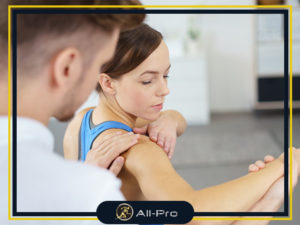Try and do these exercises while you’re recovering from a dislocated shoulder treatment
 Injuries are an unfortunate reality, particularly for those leading active lives or having physically demanding daily routines.
Injuries are an unfortunate reality, particularly for those leading active lives or having physically demanding daily routines.
These injuries can profoundly impact even the simplest tasks, such as reaching for a cereal box on the top shelf.
One such injury that can significantly hinder daily activities is a dislocated shoulder.
The shoulder is vital in facilitating movement, allowing the arm to rotate in various directions and degrees. Dealing with a dislocated shoulder can be an overwhelming experience characterized by intense pain, restricted mobility, and a disruptive effect on everyday life.
Immediate attention and appropriate treatment are crucial for a complete recovery, regardless of sports activities or accidents. Fortunately, a dislocated shoulder treatment exists.
While physical therapy is crucial in your treatment, it’s also important to do your part. You can try doing rehabilitative exercises that would help your shoulder recover from its injury. Read on to learn how.
The shoulder is an amazingly mobile joint that allows the arm to rotate over various degrees and directions. But this mobility also carries risk, making the shoulder the reason for half of all visits to the emergency room for joint dislocations.
How to identify a dislocated shoulder
When a dislocation occurs, the shoulder joint gets forcefully displaced from its normal position, resulting in severe pain and immediate loss of function. Here are some key indicators to help you identify a dislocated shoulder:
- Intense pain
- Visible deformity
- Swelling and bruising
- Limited mobility
- Numbness or tingling
It takes such a solid force to put one’s bones out of place. Twisting your shoulder joint extremely can cause the ball of the upper bone to pop out of the socket. When it’s a partial dislocation, the upper arm bone is partially in and out of the shoulder socket.
Causes of a dislocated shoulder
A dislocated shoulder can occur due to various factors and is often the result of a traumatic event or injury. Understanding the causes can help you take precautions and reduce the risk of experiencing this painful condition.
Below are the following factors that can cause a shoulder to dislocate:
- Sports: Shoulder dislocation is common among those who engage in contact sports, like hockey, football, or basketball. It’s also common in sports involving falls, such as volleyball, gymnastics, skateboarding, and downhill skiing.
- Trauma not related to sports: Other incidents not related to sports can also cause a dislocated shoulder. Falling from a moving vehicle like a motorcycle can cause a hard blow to the shoulder.
- Falls: Falling and landing awkwardly may cause you to dislocate your shoulder. Some examples would be tripping, falling down the stairs, falling from a ladder, and then landing on your shoulder.
The shoulders are the most commonly dislocated joints. But ironically, a shoulder dislocation is still a relatively rare form of injury. According to stats, only 10 per 100,000 people in the US reportedly dislocate a shoulder yearly.
Rehabilitative exercises for dislocated shoulders
-
Range of Motion Exercises
-
Find a wall or partition. Stand facing the wall and place both hands on it at shoulder level.
Push against the wall as if trying to move it, engaging the muscles around your shoulder joint. Hold this position for a few seconds, then release it. Repeat several times while focusing on maintaining stability and control.
-
Do some arm-bending. Begin by sitting or standing comfortably. With the assistance of your other arm or a therapist, gently lift the affected arm until it reaches a 90-degree angle at the elbow joint.
Hold this position for a few seconds, then slowly lower the arm. Repeat this movement for several repetitions, gradually increasing the range of motion as tolerated.
-
Grab a chair. Sit on a chair with your back upright and feet flat on the ground. Place your hands on the edge of the seat, fingers pointing towards your body. Slowly slide your hands backward, extending your elbows while keeping your shoulders stable.
Hold this position for a few seconds, then return to the starting position. Repeat this exercise several times, focusing on maintaining control and avoiding strain or pain.
-
-
Rehab Stretching Exercises
-
Do a passive stretch. Begin by standing or sitting comfortably. Gently bring the affected arm across your chest, using your unaffected arm or a towel to assist in the movement.
Hold the stretch for a few seconds, feeling a gentle pull in the shoulder. Release and repeat for several repetitions, gradually increasing the range of motion as tolerated.
-
Do wall push-ups. Position yourself facing the wall with your hands placed shoulder-width apart on the wall at chest level. Keeping your body straight, lower your chest toward the wall by bending your elbows.
Push back to the starting position. Start with a comfortable number of repetitions and gradually increase over time.
-
Flex your shoulders. Stand or sit with your arms hanging naturally at your sides. Slowly raise both arms forward, keeping them straight or slightly bent at the elbows until parallel to the ground.
Hold this position for a few seconds, then lower your arms. Repeat for multiple sets, maintaining proper form and avoiding strain or discomfort.
-
Do shoulder rolls. Sit or stand with your back straight and shoulders relaxed. Begin by rolling your shoulders forward in a circular motion. Start with small, gentle rolls and gradually increase the size of the circles as your comfort allows.
Focus on feeling a smooth and controlled movement throughout the entire rotation. Perform several repetitions in a clockwise direction. Repeat it counterclockwise.
-
Where to go for dislocated shoulder treatment
 If you suspect a dislocated shoulder, it is crucial to seek medical attention promptly.
If you suspect a dislocated shoulder, it is crucial to seek medical attention promptly.
A healthcare professional can conduct a thorough examination, potentially order imaging tests, and provide appropriate treatment to address the injury effectively.
And before doing the exercises, consult a doctor first to ensure it’s safe for you. Remember, accurate identification and timely intervention are crucial to successful recovery from a dislocated shoulder.
If you’re seeking reliable and expert care for dislocated shoulder treatment, look no further than All-Pro Orthopedics and Sports Medicine.
Our team of skilled orthopedic and sports medicine professionals dedicates to providing comprehensive and personalized care to help you recover from a dislocated shoulder.
We utilize the latest treatments and technology advancements to ensure the best possible outcomes for our patients. Book an appointment with us by calling (954)322-1110. You may also view our clients’ testimonies here.











